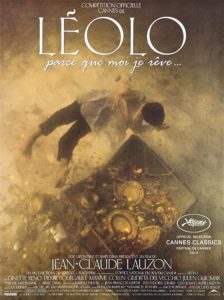 Leolo, the autobiography of a young boy, is a story with many subjects — each of them fiercely, heart-wrenchingly imagined. On one hand, it’s a story about the dark side of one of the darkest families ever committed to celluloid; on the other hand, it’s a child’s surrealistic voyage of revenge against this brood, mounted with language that is at once visceral and angrily funny. If ever verbal and cinematic prose were irremediably compatible, they are here.
Leolo, the autobiography of a young boy, is a story with many subjects — each of them fiercely, heart-wrenchingly imagined. On one hand, it’s a story about the dark side of one of the darkest families ever committed to celluloid; on the other hand, it’s a child’s surrealistic voyage of revenge against this brood, mounted with language that is at once visceral and angrily funny. If ever verbal and cinematic prose were irremediably compatible, they are here.
Leolo’s real name is Leo, but, as is characteristic of him, he means to change that and to reinvent his origins as well as his horrific life growing up in Montreal. We’re not ever really sure of his origins, since the line between what is real and what is imagined is gloriously blurred in this film. In his imagination Leolo is the descendant of a sperm laden tomato, and when his mother gives birth to him at the beginning of the film, he arrives in this world not in the form of a human being but instead — yes — in the visage of a squishy, red tomato that, when placed under a microscope by the surprised attending physician, reveals itself to contain hundreds of sperm still swimming frenetically upstream.
Things spiral upward as well as downward from here. Leolo’s parents, both of them fat and steamy, are obsessed with their children’s bowel movements, believing these to be the key to a healthy life. It is little wonder, then, that Leo/Leolo’s older brother, Fernand, and sister, Queen Rita, are the offspring of a household dementia. Fernand, lovable and stupid, becomes obsessed with body-building; Queen Rita, after being confined to a mental hospital, simply, in Leolo’s words, “floated away.”
This is Leolo’s heritage; and this film, with voiced-over narration (reading the English subtitles affords the opportunity to read delicious prose on the screen) lyrical and stunning enough to rival any great poem, or novel, of the past few centuries, charts its hero’s valiant attempts to come to grips not only with his morose childhood but, as a defense, with the unruly fantasies that more and more take over his life until he is ultimately as loony as his sad siblings. Family life has never seemed so Bunuelian; the child within that family has never howled and dreamed in quite the same way as Leolo has. In this brilliant and disturbing film, director Lauzon has forever closed the book on the perennial argument, is autobiography fact or fiction? It is pure fiction whose facts could not get a word in edgewise.
Starring Ginette Reno, Pierre Bourgault, Maxime Collin and Giudvtta Del Vecchio.
Written and directed by Jean-Claude Lauzon. Produced by Lyse LaFontaine and Aimee Danis. A Fine Line Features release. Drama-comedy, unrated. In French with English subtitles. Running time: 107 min. Screening date: 4/15/93.
Boxoffice Magazine, July, 1993